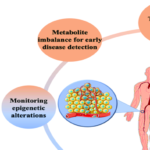A new study found that drinking beet juice on a daily basis may improve postmenopausal women’s heart health.
Beet juice increases the synthesis of nitric oxide, which improves blood flow and circulation.
When shopping for beet juice, choose for 100% juice with no additives.

A recent study reveals that drinking beet juice every day may improve blood vessel function more efficiently than a placebo. When made a regular habit during the postmenopausal years, this improvement may considerably reduce the risk of heart disease in postmenopausal women.
Dietary nitrates are naturally occurring chemicals that the body converts to nitric oxide.
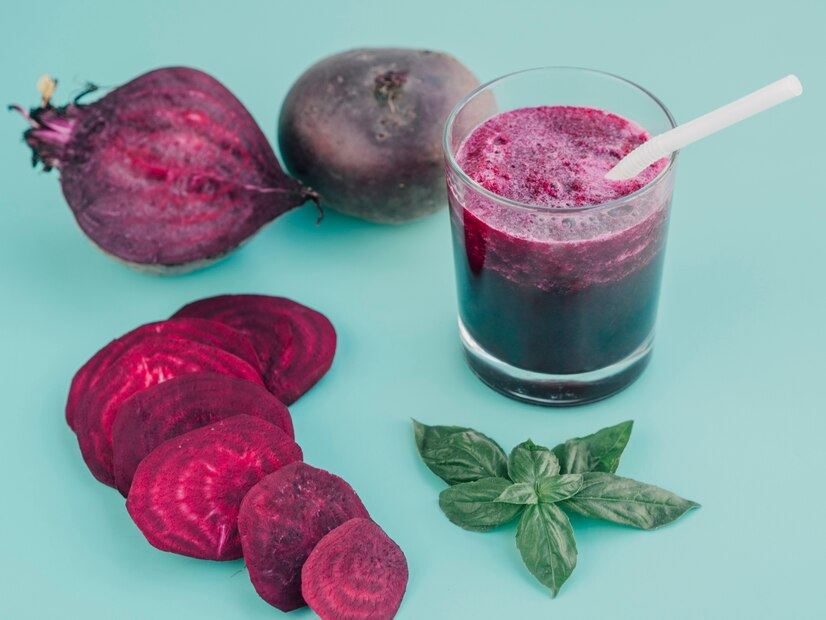
They are found in a range of foods, including beet juice, spinach, arugula.
Previous research has connected greater blood nitrate levels to improved physical performance.
New research suggests that nitrate levels in the muscle have a bigger influence on force.
Dietary nitrates can be derived from beets and dark leafy greens.
Proteins and branched-chain amino acids are among the various chemicals used by gym-goers and sportsmen to improve physical performance.
Dietary nitrate, a naturally occurring molecule that the body converts to nitric oxide, has also long been linked to better exercise performance. Studies have revealed that it helps improve muscle and cardiovascular function.
Scientists traditionally believed that dietary nitrate supplementation improved athletic performance by causing blood vessels to widen, allowing more blood and oxygen to pass through.
However, a new study.Trusted Source conducted by experts at the University of Exeter in the UK and the US National Institutes of Health, published this month in the journal Acta Physiologica, suggests that nitrates also impact another crucial region of the body to improve function.Recipe for Sweet Beet Juice.
Ingredients
- One large beet, trimmed and chopped
- One apple, cored and cut.
- 1/2 lemon.
Directions
Run all of the ingredients through a juicer. If you like, serve the juice over ice.
Pro tip: If you don’t have a juicer, you can substitute a blender. Simply combine the beet, apple, and lemon with half a cup of water, give or take, and blend on high for approximately 60 seconds. Then strain the mixture through a sieve or cheesecloth.
Dosage: One of the advantages of beet juice is that you might feel the results in as little as three hours. For the best benefits, drink one to two glasses. And if you want to see a long-term drop in blood pressure, drink at least that much every day.The results were published this week in Frontiers in Nutrition.
Drinking beet juice on a daily basis may benefit blood vessels.
Participants drank two 2.3-ounce bottles of concentrated beet juice, followed by one bottle each morning for seven days. After a few weeks, they drank beet juice without nitrates.
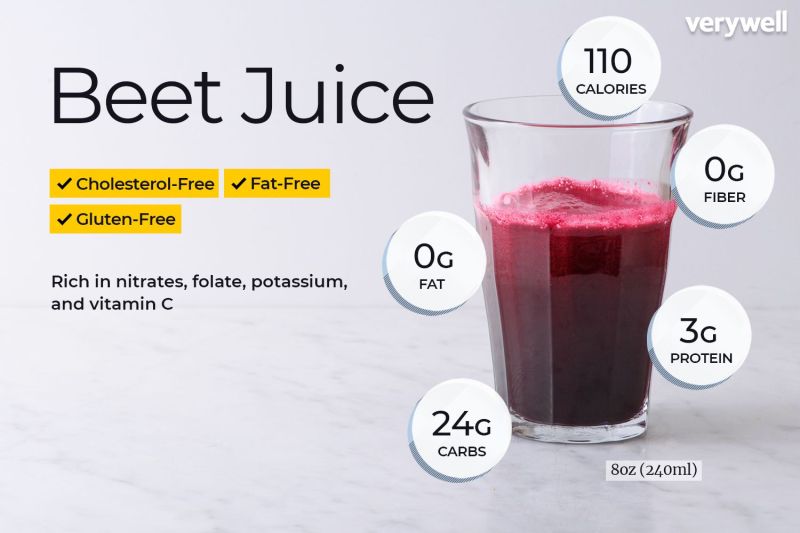
To assess vascular function, researchers examined blood vessel expansion when individuals drank or did not consume beet juice with nitrates.
The results showed that drinking beet juice with nitrate on a daily basis enhanced blood flow more than drinking beet juice without nitrates.
However, the researchers discovered that neither medication reversed the reduction in blood artery function after tissue damage occurred in postmenopausal women.
The findings also indicate that certain protective effects of beetroot juice nitrate on blood vessels fade within 24 hours of the final dose. Consistent daily or even more frequent consumption of nitrate-rich beetroot juice may be required to sustain the protective effects on endothelial function.
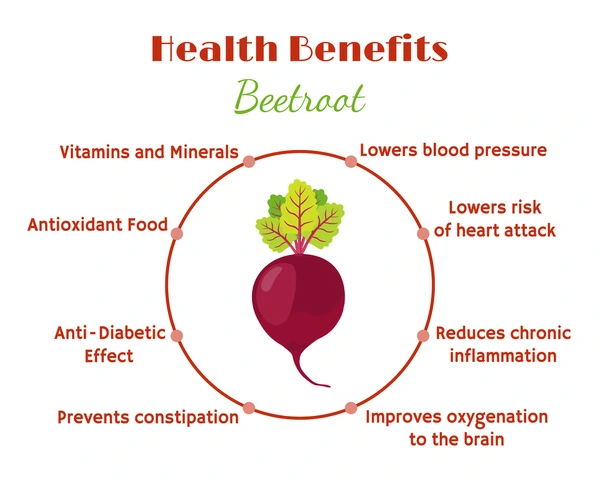
This was a tiny and short-term study. Longer-term studies are needed to determine the optimal amount and timing of nitrate intake to optimize blood vessel function and heart health in postmenopausal women.
Jocelyn Delgado Spicuzza, PhD, of the Huck Institutes of Life Sciences at Pennsylvania State University and the study’s first author, highlighted how beet juice can benefit postmenopausal women.
“Consuming nitrate through plants is a secondary pathway to increase the availability of nitric oxide in the body, a molecule responsible for widening blood vessels to accommodate blood flow and oxygen delivery to organs such as the heart,” explained Delgado Spicuzza in a reply “Since estrogen is no longer sufficient to stimulate nitric oxide production in the body naturally following menopause, dietary nitrate can be converted to nitric oxide through the entero-salivary pathway to help maintain healthy blood vessel functioning.”
John Higgins, MD, a sports cardiologist at UTHealth Houston, explained that estrogen protects vascular function in premenopausal women.
“Postmenopausal women have a higher risk of cardiovascular disease because they lose the protective effect of estrogen on vascular function and nitric oxide production which normally keeps the arteries flexible, fluid, and resistant to plaque formation,” observed Higgins. “Other effects of age include postmenopausal women [who] are less active in general and gain weight, both of which are unhealthy.”
Higgins was not a participant in the study.
Health Benefits of Beet Juice
Higgins explained that nitrate-rich beet juice increases systemic nitric oxide production and enhances endothelial function in older, healthy, and high-risk heart disease populations.
Additionally, it may help:
Lower blood pressure.
Reduce LDL or “bad” cholesterol and boost workout endurance.
Increase muscle strength in persons with heart failure.
Prevent or reduce fatty deposits in the liver and improve overall health during chemotherapy.
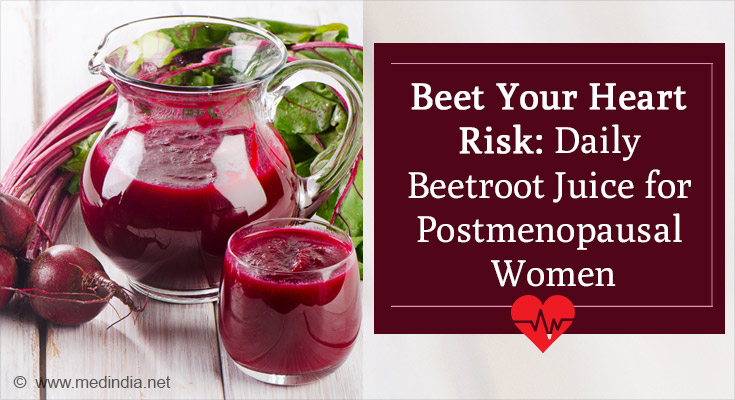
Beet’s beneficial cardiovascular effects
The study found that drinking beet juice has a specific impact on blood vessel function. Higgins stated that beet juice can help protect endothelial cells, which line the arteries, veins, and capillaries.
Beet juice targets and improves faulty endothelium function by increasing the generation of nitric oxide. Your body converts nitrates present in beet juice into nitric oxide, which improves blood flow and blood pressure, according to Higgins.
“The vascular endothelium is an important barometer of health and wellness yet is often not discussed because it is out of sight,” Higgins told me. “Abnormal endothelial function is associated with detrimental medical conditions including diabetes, hypertension, cardiovascular disease and some cancers.”
What to check for while purchasing beet juice?
When buying for beet juice, it is critical to consider the ingredients.
“Look for a good fresh organic beetroot juice with 100% juice and little to no additives, natural juices are generally better than powdered,” according to Higgins.
You can also check for additional sugars.
Takeaway
Frequent beet juice drinking may improve heart health in postmenopausal women.
Beet juice promotes blood vessel function by increasing the level of nitric oxide in the body.

